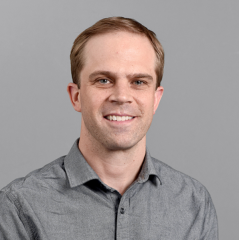The Department of Chemical and Biological Engineering welcomes David Nielsen, Associate Professor of Chemical Engineering at Arizona State University, who will be speaking on “Pathway, strain, and community engineering to expand and enhance the production of biofuels and biochemicals” as part of the ChBE Spring 2020 Seminars. The event will be on March 4, from 3:15 pm – 4:30 pm in Perlstein Hall 131, Auditorium.

Abstract
By rational re-engineering of their metabolism, ‘microbial chemical factories’ can be constructed as versatile biocatalysts for converting biomass and other renewable feedstocks into sustainable alternatives to petroleum-derived products, including liquid transportation fuels, bulk and fine chemicals, and pharmaceutical ingredients. As aided by advancements in both systems and synthetic biology, the ability to engineer novel enzyme pathways remains as a key contributor to the continued evolution of this metabolic engineering practice, the results of which are seen in the continually expanding array of products that can now be synthesized microbially. One effective and maturing pathway engineering strategy involves the compartmentalization of proposed routes into a series of compatible modules. In addition to facilitating candidate enzyme screening and flux debottlenecking efforts, said approach is furthermore useful for leveraging strain engineering efforts to access to a maximum number of target product and co-product streams, thereby supporting the development of sustainable biorefineries. As will be discussed, we have exploited these concepts to explore the de novo engineering of non-inherent and/or non-natural pathways for the microbial synthesis of a number of useful aromatic chemicals and related compounds. Lastly, in a departure from the conventional focus of using single strains in industrial biotechnology, synthetic microbial communities offer the potential to facilitate the execution of complex tasks by exploiting, for example, metabolic ‘division of labor’ and facile tunability. We have been investigating the industrial utility of synthetic microbial communities through the development of a series of catabolically-orthogonal co-culture systems with the potential to more efficiently convert biomass-derived sugar mixtures into useful fuels and chemicals.
Short Biography
David Nielsen is an Associate Professor of Chemical Engineering at Arizona State University, and currently serves as its Program Chair. Prior to joining ASU, he was a postdoc at MIT and earned Ph.D. and B.S. degrees in Chemical Engineering from Queen’s University at Kingston and University of Colorado at Boulder, respectively. His research group works at the interface of metabolic engineering and synthetic biology, while also applying key elements of applied microbiology and bioprocess engineering, develop novel biotechnologies for the microbial conversion of renewable feedstocks to useful biofuels and biochemicals. His research has been supported by the National Science Foundation, the Department of Energy, and several Industry partners.
